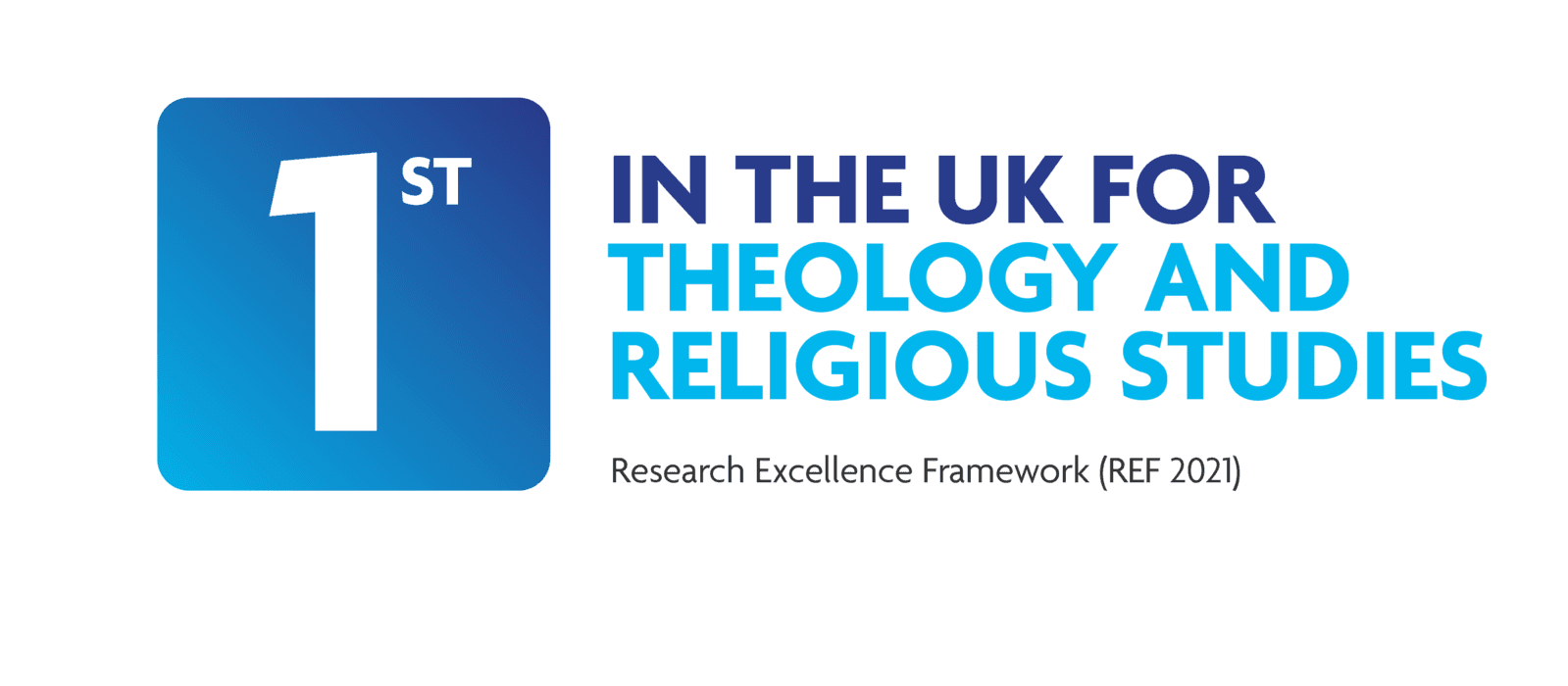Earn a Masters degree in the New Testament and Early Christianity, 100% online.
Join our world-class department of Divinity and Religious Studies for this flexible online Masters degree.
Undertake research-driven courses in advanced biblical studies with experts in ancient Judaism, New Testament, and Patristics, wherever you are in the world.
This Masters qualification provides an excellent foundation for PhD study, as well as continuing development for professionals seeking to enrich their knowledge.
Outstanding expertise
You’ll be joining an ancient UK university where Divinity has been taught for more than five centuries.
Today, we’re a major centre of Christian theological study, carrying out cutting-edge research in New Testament and Early Christianity that seeks to both advance the field and support faith communities.
Research excellence
We’re rated 1st in the UK for the quality of our Theology research in the latest Research Excellence Framework (REF 2021).

Choose the University of Aberdeen for online Theology courses

2nd in Scotland for Theology
We’re rated 2nd in Scotland and 5th in the UK for Theology by the Complete University Guide 2026.

26th in the world for Theology
We’re rated 26th in the world for Theology, Divinity and Religious Studies (QS World University Rankings 2025).

Over 525 years of excellence
Join a university founded in 1495, where Divinity has been taught for more than five centuries.
Who can join this online MTh in New Testament and Early Christianity?
This distance-learning degree is ideal for anyone interested in studying: early Christianity, the New Testament, Theology, Divinity, biblical studies, church history, and Patristics.
Academic development
This MTh and its courses provide an essential foundation for further academic work in New Testament Studies or Patristic Studies, including progression to a PhD.
Professional development
This degree and its courses are also ideal continuous professional development (CPD) for leaders in religious communities and professionals working in faith-based organisations, such as schools or charities.
You can study with us online from anywhere in the world, with no student visa required.
By the end of this degree, you’ll be able to...
-
Read early Christian literature closely, including scripture, with an advanced knowledge of historical, literary, and thematic elements.
-
Assess the range and significance of various modes of scriptural interpretation in antiquity among Jews and Christians.
-
Explain the principal factors that gave rise to particular theological developments in early Christianity and their later trajectories.
-
Engage with significant scholarly debates in the field of New Testament studies and early Christianity to develop your own emergent, informed position.
-
Evaluate the relative merits of various approaches to interpreting early Christian literature.
What you’ll study
You can choose to study for a:
- Masters (180 credits)
- Postgraduate Diploma (120 credits), or
- Postgraduate Certificate (60 credits).
How you’ll study
Online learning
This distance-learning degree in New Testament and Early Christianity is delivered flexibly, 100% online.
You can learn with us anywhere in the world, no student visa required, and manage your study hours to suit you.
Your teaching
Teaching is delivered through MyAberdeen, our online Virtual Learning Environment (VLE). It holds all the materials, tools and support you’ll need in your studies. Take a look around MyAberdeen.
You can access your learning materials on computer, smartphone and laptop, 24 hours a day. You’ll find a range of online resources available, including:
- reading materials
- seminars
- discussion boards with your tutors and peers
- access to hybrid postgraduate research seminars
- access to our award-winning Sir Duncan Rice Library.
Biblical and Classical Greek texts
Your studies will feature texts transmitted in Biblical and/or Classical Greek, in their original languages and in translation. In studying these texts, you can develop your applied language skills.
You do not need to have any previous training in these languages to join this degree. If you’re interested in additional language training while you study, introductory courses may be available at an additional cost.
Your tutors
This MTh is delivered by our School of Divinity, History, Philosophy and Art History (DHPA).
You’ll learn from academics who are active researchers in the fields of New Testament and Early Christianity.
Our Department of Theology is recognised internationally as one of the foremost research institutions in Theology.

Dr Katherine Hockey
Katherine is a Lecturer in New Testament at the University of Aberdeen. She has published on ancient philosophy of emotion and 1 Peter.
Her current research interests include the Catholic epistles, emotion studies and the New Testament, and Christian identity construction.
Katherine is co-chair of the Later Epistles seminar of the British New Testament Society, and she is the Coordinator for MTh New Testament and Early Christianity.
View Katherine’s profile
Reverend Professor John Behr
John is Regius Chair in Humanity at the University of Aberdeen. He has written a wide range of books on Patristics as well as the Gospel of John.
His current research interests include scriptural interpretation and anthropology, questions of life and death, and the hermeneutics of reading texts.
John serves on a number of editorial boards of the International Journal of Orthodox Theology.
View John’s profile
Dr Logan Williams
Logan is the Kirby Laing Research Fellow in New Testament. He has published on ritual purity and eschatology in the Gospel of Mark, and Christology and ethics in Galatians.
His current research explores the relationship between ritual and human transformation in Jewish and Christian antiquity.
Logan was winner of the 2022 Paul J. Achtemeier Award for New Testament Scholarship.
View Logan’s profileThis degree is assessed entirely online via:
- research essays
- critical book reviews
- reflective-learning journals
- exegetical journals
- creative assessments, eg, poster presentations.
Hours for taught courses
To study part-time, we recommend you take a maximum of one 30-credit course per term.
30 credits
- Around 300 hours of study and assessment time to complete.
- You’ll study 15 – 20 hours per week per term, plus more at assessment times.
This is a guide to the time required for a typical student at this level to achieve the learning outcomes. This includes time for independent study, as well as teaching and assessments.
You can largely set your own study hours each week to cover the materials. MyAberdeen is available 24/7, so you can log in and study when it suits you.
Activities at fixed times
There may be some activities scheduled at fixed times, such as weekly live seminars, online meetings with your tutor or assessments with deadlines. But otherwise, you can access and work through each course at your convenience.
Hours for 60-credit dissertation
A 60-credit dissertation is around 600 hours of study time.
You can start the dissertation after you have completed at least two courses in this MTh programme.
You have flexibility over when you carry out the work. You can centre most of the workload in the summer months, when you do not have any other courses.
Our first-class support structure will ensure that you aren’t alone in your studies. You’ll have contact with your coordinator via email, MyAberdeen and Microsoft Teams. You can use social media and discussion boards to chat with your fellow students too.
We provide a wide range of services to support you in your studies and beyond:
- Careers and Employability Service
- Disability support
- IT support
- Library support
- Student Support Service – help with finances, wellbeing, and non-academic issues
- Student Learning Service – study skills support and advice
- Aberdeen University Students’ Association (AUSA) – run by students for students
- Toolkit – clever apps and free training that can make your study life easier
Wherever you are in the world, you’ll feel part of our very special Aberdeen learning community.
When you study with us, you can expect a first-class support structure so that you’re never alone in your studies.
But learning online does mean you have to motivate yourself and manage your own time.
Your most important commitment will be time – the time to work through, reflect on and understand your teaching materials.
Before you start a course that involves a high degree of independent study, we recommend looking at the time you will be able to devote to your studies each week:
- Be realistic
- Create a weekly schedule as a guide
If you have any questions about studying online, get in touch with our friendly team. We’re here to help.
We’re a member of the Access scheme run by the Society of College, National and University Libraries (SCONUL).
Access study spaces, books and journals in your area
The SCONUL Access scheme allows you, as a University of Aberdeen student, to access books and resources at university libraries across the UK and Ireland, or visit them for a quiet place to study.
You’ll be able to use study spaces, books and journals at over 150 university libraries which belong to the scheme.
Your support team
Our friendly team are here to answer any queries you have before, during and after your studies.

Dr Katherine Hockey
Katherine is the degree coordinator. She’ll be on hand to answer any questions about degree content before you start and to help you throughout your studies.

Kate Smith
Kate is part of the School’s support team. She’ll be there throughout your studies to answer any of your non-academic queries.

Get in touch
The online education team is here to answer any questions you have right now about this qualification, or about studying online.
Ask us a questionWhere this will take you
Your MTh qualification
On successful completion of this programme, you’ll earn a respected MTh in New Testament and Early Christianity from the University of Aberdeen, one of the UK’s six ancient universities.
You’ll receive exactly the same qualification online as you would on campus. Your degree title will not mention online or distance learning.
Towards a PhD
This Masters qualification also provides ideal preparation to pursue further postgraduate research, including doctoral studies.
Careers
The courses that are part of this MTh are ideal continuing professional development (CPD) opportunities for those working in:
Faith communities
- including ministers, priests, and volunteers in churches or faith-based organisations.
Educational settings
- including teachers providing religious and moral education in non-denominational schools, and teachers in private faith-based schools.

Lifelong career support
Our career support doesn’t stop when you graduate.
You have access to our free careers service while you study, and beyond.
- 1:1 appointments
- CV checks
- Interview prep
- Job opportunities
Fees and funding
Tuition fees typically increase each year. A 3% fee rise has been confirmed for academic years 2026/27, 2027/28 and 2028/29.
Our indicative costs include a 3% fee rise each year.
Pay as you go
This is a pay-as-you-go qualification.
You do not have to pay the full tuition fee upfront.
You can spread the cost and pay as you go, term by term.
How it works
- You decide how many credits to study for each term.
- At the start of term, you pay only for the credits you’re taking that term.
- This gives you control over your costs and workload for each term of your qualification.

Your personalised cost breakdown
Use the degree scheduler to plan your studies and see your cost breakdown, term by term.
Learning resources
Access to all the books and resources you need are included in your tuition fee. They’ll be made available to you online and you do not have to buy your own copies.
Printing
You may wish to set aside a small budget for printing, depending on how you like to work.
There are several ways you may be able to get help funding your studies:
- Employer sponsorship – we accept full and partial fee payments from sponsors
- Student loans
- Scholarships – search our funding database for scholarships
Find out more about funding options.
Student card
All our students are entitled to a University of Aberdeen student card. This gives you access to a range of student discounts around the city and online.
20% Alumni discount
You’re entitled to 20% off our postgraduate taught degrees and short courses if you have a degree from the University of Aberdeen. View Alumni discount details.
How discounts work
Discounts are applied during your application process. You can only use one discount per application.
Entry requirements
MTh, PgDip, PgCert
- 2:2 UK honours degree in a relevant discipline, or
- equivalent qualifications.
You’re also welcome to apply if you have:
- other relevant qualifications, and
- professional experience with supportive references.
Entry requirements
We welcome students from all over the world.
See the minimum entry requirements above. If you do not have qualifications from the UK, check equivalent qualifications from your country.
Visa requirements
You do not need a student visa to study online with us.
English language requirements
Teaching is delivered in English.
If English is not your first language, use our English requirements checklist to see if you need to provide evidence of your English language skills when you apply.
English language tests and scores
If you do need to provide English language test scores, these are the tests and minimum scores we accept.
These are our Postgraduate Higher requirements.
IELTS Academic, IELTS UKVI Academic, or IELTS Online (not IELTS Indicator or IELTS General Training)
- 6.5 overall
- 5.5 for listening and speaking
- 6.0 for reading and writing
TOEFL iBT or TOEFL iBT Home Edition
- 90 overall
- 17 for listening
- 21 for reading
- 20 for speaking
- 21 for writing
- TOEFL DI code is 0818
Cambridge English: B2 First, C1 Advanced, or C2 Proficiency
- 176 overall
- 162 for listening and speaking
- 169 for reading and writing
LanguageCert Academic / LanguageCert Academic SELT
- 70 overall
- 60 for listening and speaking
- 65 for reading and writing
Oxford ELLT Digital – English Language Level Test Online
- 7.0 overall
- 5.0 for listening and speaking
- 6.0 for reading and writing
PTE Academic (online test not accepted)
- 62 overall
- 59 for listening, reading, speaking and writing
Skills for English: SELT
- B2 pass with merit
Duolingo – tests taken from 1 July 2024 onward
- 120 overall
- 95 for listening and speaking
- 105 for reading and writing
University of Aberdeen English Pre-sessional Programme (PSE)
- Pass
- Valid for one year. Refresher can be offered if out of date
Pre-sessional academic English preparation programmes undertaken at other UK universities
- Pass at an equivalent of 6.5 (C1)
- B2 in all four skills
- Certification must be within one year prior to the start of your course
For more information about language qualifications see our English Language Requirements page.
You apply through our online Applicant Portal. It allows you to upload relevant qualifications and documents.
There is no application fee for our online programmes.
What you need to apply
- Degree transcript
- Personal statement
- Degree certificate
- References x2
References
You will need two reference letters. One should be from your university discussing your academic ability. If you have been out of education for a long time, you can use your current or most recent employers or other professional individuals.
Apply now
Start with our step-by-step guide. It explains degree transcripts, what to write in your personal statement and how to use our Applicant Portal.
You can apply to start in either September or January.
Apply as early as you can. This is so we have time to review your application and get a decision to you. We also want to ensure you have time to enrol before teaching starts.
September 2026 intake
For our September 2026 intake, the application deadline is 6 September 2026.
You will need to accept your offer and provide any outstanding documents to meet the conditions of your offer by 13 September 2026.
Teaching starts on 21 September 2026.
January 2027 intake
Teaching starts on 25 January 2027.
Application deadlines will be announced in due course.
You will need access to:
A computer (PC, laptop or Mac) with an up-to-date operating system
Most teaching materials are smartphone- and tablet-friendly. But we recommend a proper laptop or desktop for completing assignments comfortably.
Reliable internet access
We recommend:
- a wired connection
- a minimum download speed of 2 Mbps so you can take part fully in live sessions.
Speakers or headphones
- We recommend a headset with built-in microphone and earphones if you’re likely to study in an environment with background noise.
- A webcam is optional, but you may like to use one for some interactive sessions.
Software
We’ll give you access to Office365 applications. This means you can use online versions of Microsoft Word, Excel, PowerPoint and OneDrive and install these programs on up to five personal devices.
If your course requires specialist software, we’ll provide you with access to this and a licence that lasts throughout your studies.
See our detailed IT requirements for more information.
Try our degree scheduler

Choose your courses
See all the courses that are part of this degree and choose what you want to study.

Manage your study schedule
Control the pace and cost of your degree. Decide how much you want to study each term.

Save to your wishlist
Save your schedule to your wishlist so you can view and edit anytime.
Master of Theology
180 credits
£11,180
This indicative cost is based on 180 credits of study over three years, starting in September 2026.
Postgraduate Diploma
120 credits
£7,340
This indicative cost is based on 120 credits of study over two years, starting in September 2026.
Postgraduate Certificate
60 credits
£3,620
This indicative cost is based on 30 credits of study per term, starting in September 2026.
Apply for this programme
- Start month
- September or January
- Indicative cost
- £11,180
This indicative cost is based on 180 credits of study over three years, starting in September 2026.
Apply via our Applicant Portal


